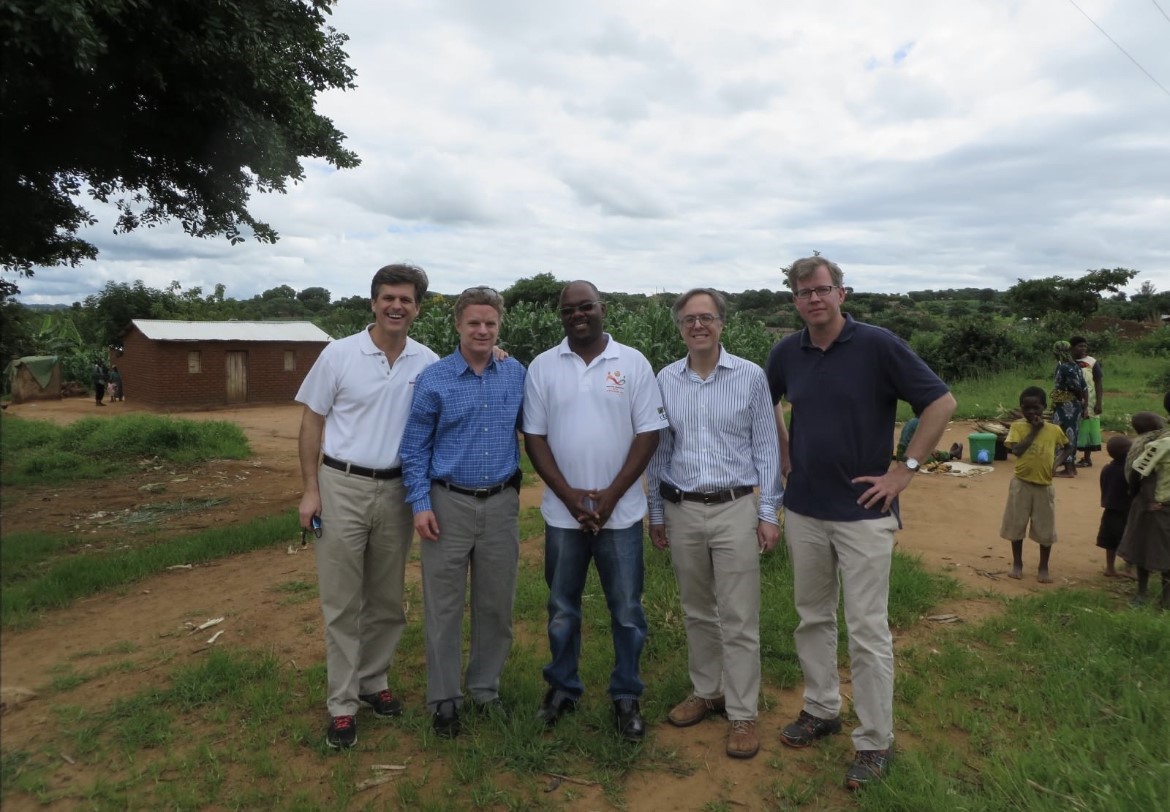
Tim Shriver, John Bridgeland, Peter Mazunda of Special Olympics Malawi, Mike Gerson, and Steve Neill, formerly of Special Olympics International
Love, the heart of all things
The tributes to Mike were almost as soaring as he was. His great friends, John Bridgeland, Pete Wehner, Josh Bolten, and Scott Baker told us of his majestic pen as he wrote the story of the candidacy and presidency of George W. Bush, his restless faith as he tried to become an “evangelical Episcopalian,” his piercing humor as he made light of his heart disease, his cancer, his Parkinson’s disease (can you imagine?!)—from college to the last days of his life. Judy Woodruff read the prayer of St. Francis—“make me a channel of your peace.” His brothers Vic and Chris read from scripture. The program included the words written by Mike and spoken by President Bush after 9/11:
“The world He [God] created is of moral design. Grief and tragedy and hatred are only for a time. Goodness, remembrance, and love have no end. And the Lord of life holds all who die, and all who mourn.” (September 14, 2001)
I am so blessed that John Bridgeland introduced me to Mike some 15 years ago. We started a book group together with our colleague Tom Rosshirt (usually just reading Mike’s writings and marveling at them), we worked on Unite together, we traveled to visit Special Olympics leaders in Malawi together, and we even went on (somewhat) silent retreats together.
Four years ago, I asked his advice on writing an essay about the importance of finding a new mindset for our times—grounded in the practice and belief in the dignity of every human being. Roshi Joan Halifax had told me that “we are grieving as a people, but our greatest sadness is grieving the loss of hope.” I asked Mike to help me with the writing (smart right?) and we framed the challenge like this: “Behind many of our failures are failures of empathy, failures of sympathetic imagination, failures of trust, failures of love. Our crisis raises deeper questions: How do you cultivate spiritual courage in the face of oppression? How do you summon compassion across cultural canyons? How do you encourage a sense of oneness in a fragmented society?”
But Mike had already captured the main point when he gave a stunning homily about depression and transcendence at the National Cathedral in 2019. “The answer,” he said, “to the temptation of nihilism is not an argument – though philosophy can clear away a lot of intellectual foolishness. It is the experience of transcendence we cannot explain or explain away. It is the fragments of love and meaning that arrive out of the blue – in beauty that leaves a lump in your throat… in the peace and ordered complexity of nature… in the shadow and shimmer of a cathedral…” He seemed to be near tears as he spoke. But he was clear: we are fully awake only when we are awake to transcendence.
As he continued to preach, Mike counseled those with depression to seek help, to welcome the kindness and brilliance of doctors and caregivers alike, and to find ways to regain what he harshly called his “right mind.”
A few weeks before Mike died, I visited him in the hospital where he was resting with his wonderful wife, Dawn. Mike was weak but we told a few stories, we laughed a bit, and we brainstormed plans. “A consensus in American politics hasn’t happened, but it does make some sense now,” he said. I asked him about how. “It’s almost as though God’s intervention is needed,” he said. “Complete victory for either side is only designed to provoke the other side…We need a politics that doesn’t become hateful.” So we do.
I wish Mike had seen the recent coverage of the the Dignity Index (here, here, and here) which aims to create a politics without hate. I think we should run “Dignity” for President but only if we can first run Dignity in our own lives and families. Mike would be the perfect speech writer for the campaign.
Near the closing of Mike’s homily, he returned to the experience of transcendence: “In our right minds,” he said, “we know that transcendence sparks and crackles around us – in a blinding light, and a child’s voice, and fire, and tears, and a warmed heart, and a sculpture just down the hill – if we open ourselves to seeing it.
“Fate may do what it wants. But this much is settled. In our right minds, we know that love is at the heart of all things.”
It’s now our work to bring the love at the heart of all things to bear on the challenges of our lives, of our country, of our time. I thank God that Mike gave his life to that endeavor. I thank God equally for each of you who are answering that call and striving mightily to bring about the good for us all.
The views expressed are those of the author and not necessarily those of American Baptist Home Mission Societies.


